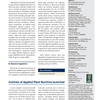Green genetic engineering in Africa
Although the commercial cultivation of genetically modified (GM) plants in Africa has been relatively modest until now, a number of research and development projects in this field are already operating in several African countries. These involve breeding drought-tolerant, pest-resistant or nutrient-enriched maize, or cassava varieties with greater disease and pest resistance.
International consortiums are behind many GM-related research projects. Governments and foundations from the industrialised countries provide financial support, while private seed companies make the basic technology available free of charge, and regional organisations are responsible for coordination.
Western and regional universities and research facilities as well as international agricultural research centres are involved in the actual research and development. Examples include the ''Water Efficient Maize for Africa'' project (WEMA) and the ''Africa Biofortified Sorghum'' project (ABS).
Statutory regulations
Before the commercial cultivation of genetically modified organisms (GMOs) can become more widespread, competent regulatory authorities and appropriate legal provisions are required. Many countries in Africa have already drawn up national biosafety frameworks governing the use of GMOs, mostly with financial support from the United Nations' Global Environment Facility.
Most nations, however, are still lagging behind with the development of government agencies capable of approving field trials of GM plants or their commercial cultivation. The 19 member states of the Common Market for Eastern and Southern Africa (COMESA) took a major step forward in early October 2010 when they suggested a joint approach to biosafety issues. This approach envisages uniform risk assessments on new GM varieties.
Participating countries hope to combine their regional capabilities and overcome capacity constraints. Any decision to grow such crops, however, will still be made by the individual nations. Most African nations have also signed the Cartagena Protocol, an international agreement on biosafety which governs the transboundary movement, handling and use of GMOs.
More information:
www.biosicherheit.de




